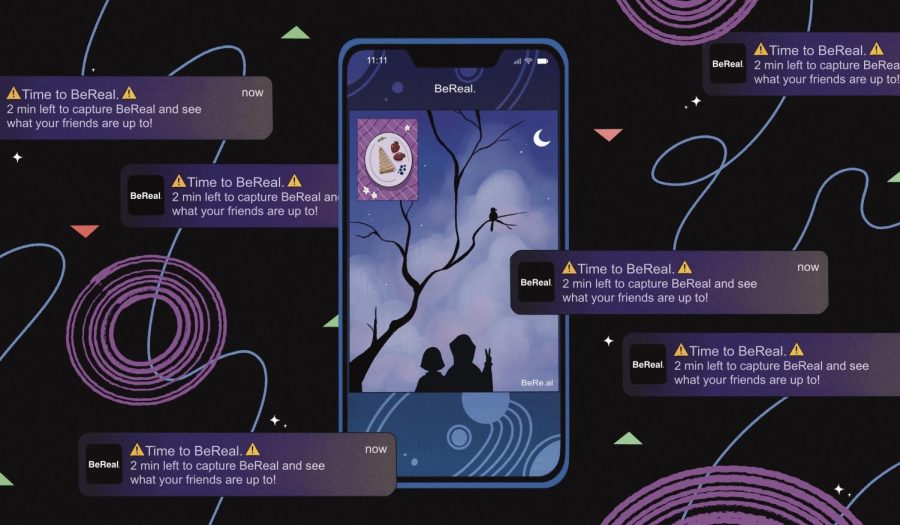BeReal & the Search for Authenticity on Social Media
Photo by Michelle Deng/ UCSD Guardian
May 7, 2023
Social media plays a major part in our lives, and it is seemingly impossible to survive without it. And while hyper-connectivity is rewarding in many ways, there is no replacement for real-world human connection. So with the majority of people spending an average of two hours a day on these platforms and social media being a relatively new innovation, how much are we harming our own mental health? TikTok’s algorithm makes it way too easy to spend hours on the app without even realizing it. Instagram enables you to compare yourself to others’ carefully curated profiles, and Facebook’s widespread misinformation makes it hard to even know what to believe. The only platform to date that seems to be intentionally fostering a positive experience for users is BeReal, which rose to popularity in early 2022.
For those who are unaware, the app’s premise is that each day at a different time, users are notified to capture a BeReal within a two minute window, taking a picture with both their front and back cameras. BeReal strives for an authentic version of social media where we are motivated to show our “true” selves and share little moments of our everyday lives, contrasting from the careful curation of most other social media outlets. The app received rave reviews when it first blew up. Everyone was using it, excited by this cool new concept that provided a refreshing change of pace from the profit-driven experience characteristic of social media.
BeReal seemed to be the first app to listen to users about what they want from social media, as this search for authenticity online has long been a concern. The push for more genuine social media usage has been apparent on multiple platforms, including the phenomena of “casual Instagram” rooted in nostalgia for the app’s earlier days and rejection of its current performative nature.
With this recent discourse, I have come to reevaluate my own relationship with social media, as the only thing I find myself to be after hours on my phone is drained and overwhelmed. I am bombarded with the products I should be buying, aesthetics I should align with, opinions after opinions and social issues that torment my mind, yet I sit in my room alone on my phone not doing anything at all but consuming. I find myself feeling like a mere pawn in this system where we are simultaneously the customer and the product. Overconsumption is so firmly pushed onto us that we are plagued by the need to have the new viral product, despite the fact that the next “best” product will be all over the internet in the next week. It is only becoming harder to differentiate between real people making real posts and thinly veiled advertisements that are promoting some product or lifestyle.
Despite knowing all this, I cannot help but find myself enthralled in this vicious cycle of social media consumption that doesn’t feel authentic at all. Nothing about it seems genuine or adds value to my real life. BeReal may be the closest we have gotten, yet there is something telling me that social media will never have the authenticity we crave.
BeReal is a step in the right direction, but it is quite clear that it has passed its prime. The thing with reality is that it’s repetitive, boring at times, and not profitable for corporations. How many BeReals of computer screens and bedroom ceilings can you see before the novelty wears off? Personally, I no longer post on the app as regularly as I used to and almost never interact with my friends’ posts when I do. BeReal does not profit off its users the same way Instagram, TikTok, or Twitter do, primarily because it opposes implementing advertising, sadly making sure that those who do remain on top while BeReal’s popularity steadily declines.
While at first I was captivated by BeReal much like every other college student, it soon became a nuisance when I found myself procrastinating posts and becoming especially irked by the various notifications it sent throughout the day whenever a friend posted late. Instead of posting right when it is “Time to BeReal,” I opted to turn off notifications for the app. Now, rather than wanting to see my friends’ posts, I am only incentivized to post so that I can look back on my own later. Despite how narcissistic this may sound, I find BeReal to be a surprisingly good form of a digital scrapbook of my day-to-day life, although this does require you to actually post. Regardless, my enthusiasm for the app has waned as there seems to be social pressure that comes along with posting. Feeling as though you need to be doing something exciting in order to post — although it defeats the purpose of the app — is a very real sentiment among users and myself and many of my friends are guilty of this. This just goes to show that our ingrained social media habits may be harder to shake than we think.
While it may not be within our jurisdiction to change the way social media works, the best thing we can do is control our consumption habits. It is so easy to get caught up in the endless cycle of doomscrolling, but I notice that I feel monumentally better on the days where I spend less time on my phone. If you find yourself feeling the same way, this is your reminder to spend some time outside, hang out with friends or family, or spend time with hobbies you enjoy. One of my favorite things to do when I feel particularly overwhelmed is reading a book outside or going on a walk. Spending some time slowing down from the overstimulation of the internet makes it so much easier to realize that there’s more to life than an 11-hour screen time.
Art by Michelle Deng of the UCSD Guardian

















Lilly W • May 10, 2023 at 10:15 pm
Well done, Mehak!